The Golden State Valkyries have found their head coach with Natalie Nakase taking the job.
Nakase, who has spent the last three years as an assistant with the Las Vegas Aces, was hired Thursday by the expansion franchise that begins play in 2025.
“Being named the head coach of the Golden State Valkyries is a lifelong dream come true,” Nakase said. “I am thankful to Joe Lacob, Ohemaa Nyanin and the Golden State front office for entrusting me with this responsibility. We are committed to building a winning culture of grit, hard work, and competitiveness. We will strive to improve, compete, and ultimately bring home a championship for our fans and this organization.”
Nakase helped the Aces to back-to-back WNBA championships in 2022 and 2023. Prior to her time with the Aces, Nakase spent 11 seasons in various capacities with the Los Angeles Clippers, most recently as an assistant coach and player development coach in a dual role with the NBA team and their G League affiliate, the Agua Caliente Clippers.
She got her coaching start in 2008 with the Women’s Professional Basketball German League, serving as head coach for the Wolfenbuttel Wildcats for two seasons (2008-10). She then served as an assistant coach for the Tokyo Apache for one season (2010-11) in the Men’s Professional Basketball Japan League, followed by acting as head coach for the Saitama Broncos from 2011-12, making her the first woman to serve as head coach in the league.
“Natalie is the perfect candidate to lead the Valkyries as our head coach,” Golden State GM Ohemaa Nyanin said. “She exemplifies every character trait in what we were looking for in a head coach and possesses deep expertise across professional basketball. Her journey is representative of the grit and perseverance that our team will embody to achieve our ultimate goal of winning championships.”
The Los Angeles native was a walk-on at UCLA, serving as a team captain for three seasons. She played professionally for two years in the NWBL with the San Jose Spiders and San Diego Siege.
Nakase said the interview process started around the Olympic break and as soon as her season in Las Vegas ended she moved to the Bay Area.
“I literally was in meetings two days ago with the Las Vegas Aces. So it was a quick change, after I found out,” she said. “It’s exciting. And obviously as soon as I heard the news, I mean, I was jumping for joy and was ready to go.”
Nakase was a little nervous about telling the Las Vegas staff and players, but said they couldn't have been nicer.
“It was a bunch of hugs, tears, you know, and it couldn’t have been better for me,” she said. “Just because having that support, it meant a lot. You know, it’s completely different than not having a lot of support.”
AP WNBA: https://apnews.com/hub/wnba-basketball

FILE - Las Vegas Aces assistant coach Natalie Nakase, right, and interim head coach Tyler Marsh look on during the second half of a WNBA basketball game against the Seattle Storm, Saturday, May 20, 2023, in Seattle. (AP Photo/Lindsey Wasson, File)
BEIRUT (AP) — As the war between Israel and Hezbollah intensifies, Lebanese civilians are increasingly paying the price – and this dangerous reality often becomes clear in the middle of the night: That’s when the Israeli military typically warns people to evacuate buildings or neighborhoods to avoid airstrikes.
Moein Shreif was recently awakened at 3 a.m. by a neighbor calling to alert him that Israel planned to strike a nearby building in his middle-class suburb south of Beirut where Hezbollah has a strong presence.
Shreif, his wife and their three children quickly fled their multi-story apartment building and drove away. Within minutes, explosions rang out, he said later that day upon returning to see the smoldering ruins of his building and the one next door.
“I didn’t even have time to dress properly, as you can see,” said Shreif, a well-known Lebanese folk and pop singer who was still wearing his pajamas from the night before. “I didn’t take anything out of the house.”
Israel and Hezbollah have been exchanging strikes nearly every day since the start of the war in Gaza. Hezbollah says it will fire rockets into Israel until there's a cease-fire in Gaza; Israel says its fighting to stop those attacks, which have forced tens of thousands of Israelis from their homes.
But it wasn’t until late last month, when Israel dramatically expanded its aerial campaign against Hezbollah, that Lebanese people began receiving regular warnings about upcoming airstrikes. Human rights groups say Israel's warnings — which aren't issued before many airstrikes — are inadequate and sometimes misleading.
On Sept. 23, Israel made 80,000 calls into Lebanon, according to Imad Kreidieh, head of the country’s telecommunications company – presumably recorded warnings about upcoming airstrikes.
The calls caused panic. Schools shut down. People rushed home early from work. It ended up being the deadliest day of airstrikes in Lebanon in decades, with over 500 people killed — roughly one quarter of all those killed in Lebanon the past year, according to the country’s Health Ministry. Women and children make up one quarter of all the deaths, the ministry says.
Israel has issued warnings on social media nearly every day since then.
On Oct. 1, 27 villages in southern Lebanon were told to evacuate to the north of the Awali River, dozens of kilometers (miles) away. “Save your lives,” the instructions said.
That is when Salam, a 42-year-old mother of two, fled the village of Ain Ebel. She and her family are now staying with relatives in Beirut. Salam refused to give her full name for fear of reprisals.
So far, Ain Ebel – a mostly Christian village – hasn’t been bombarded, although surrounding villages whose residents are predominantly Shiite Muslims have been. Salam's teenage children are terrified of going home, especially since Israel launched a ground invasion.
Salam is still baffled and angry that her village was evacuated.
So far, evacuation notices in Lebanon have been far more limited than in Gaza, but the messages in both places have a common theme. In Gaza, Israel says it is targeting Hamas militants embedded among Gaza's civilians. In Lebanon, it warns of similar behavior by Hezbollah, a Hamas ally.
Most of the Israeli military's warnings first appear on the social media accounts of its Arabic spokesperson. They are then amplified by the Lebanese media.
The warnings instruct people to vacate homes “immediately,” and they are usually followed by a series of overnight strikes that often cause damage in areas beyond those that were warned. Israel says it is targeting Hezbollah fighters, weapons or other assets belonging to the group. Warnings are rarely issued before daytime strikes.
The Lebanese government says at least 1.2 million people have been displaced by the war, the vast majority since Israel ramped up airstrikes across the country last month. Over 800 of some 1,000 shelters are over capacity.
One quarter of Lebanese territory is now under Israeli military displacement orders, according to the U.N.'s human rights division.
“Calling on residents of nearly 30 villages to leave ‘immediately’ is not effective and unlawfully suggests that civilians who do not leave an area will be deemed to be combatants,” said Ramzi Kaiss, a researcher for Human Rights Watch in Beirut.
Kaiss said Israel — which usually issues warnings 30 to 90 minutes ahead of airstrikes — is obligated to protect civilians who refuse to evacuate, or who are physically unable to.
Amnesty International is also critical of Israel's practice of warning entire towns and villages to evacuate. It “raises questions around whether this is intended to create the conditions for mass displacement,” Agnes Callamard, the group's secretary general said in a statement on Thursday.
The Israeli military didn’t respond to a request for comment. It has previously said it makes a significant effort to save civilian lives with its warnings.
For almost a year, Israel’s strikes were mostly concentrated in communities along the border, far from the capital and its populous suburbs. But now people who once felt relatively safe in the outskirts of Beirut are increasingly at risk, and their neighborhoods are receiving a small but growing share of airstrike warnings.
In Shreif’s case, he said his neighbor called about five minutes after the Israeli military issued a warning on the social media platform X.
Shreif considers himself lucky: If it wasn’t for that wake-up call, his family might not be alive. The AP could not determine whether any people were killed or injured in the strike that destroyed Shreif's building or the one next door.
To the northeast of Beirut, in the Bekaa Valley, Israel recently issued a warning to people to stay at least 1,000 meters (yards) away from their town or village if they are in or a near a home that has weapons belonging to Hezbollah.
Some of the warnings have come in the form of animated videos. One shows an elderly woman in a kitchen, suggesting she is unaware of hidden rooms and compartments in her own house that contain weapons for Hezbollah.
“Didn’t you know?” the narrator says in Arabic, as the elderly woman discovers rockets under the couch, behind the shower curtains and elsewhere. The video warns viewers to leave their homes immediately if they – or their neighbors – discover weapons.
But in many cases there are no warnings at all.
Last month, in Ain el-Delb near the southern city of Sidon, an Israeli airstrike hit a residential building, burying about 70 people under the rubble.
Achraf Ramadan, 34, and his father were among the lucky one who rescue workers were able to pull out alive. His mother was taken to the hospital alive, but she later died from her wounds. His younger sister Julia, a public relations professional in her late 20s, was found dead. Achraf and Julia together had been leading initiatives to support displaced Lebanese families in and around Sidon.
“This is a nice and peaceful neighborhood,” Ramadan said, sounding dejected. “The international community is asleep and not taking initiative. On the contrary, I think it's giving Israel an excuse for its barbarity on the pretext of self-defense.”
Associated Press writers Fadi Tawil in Beirut, Julia Frankel in Jerusalem, and Zeina Karam in London, contributed to this report.
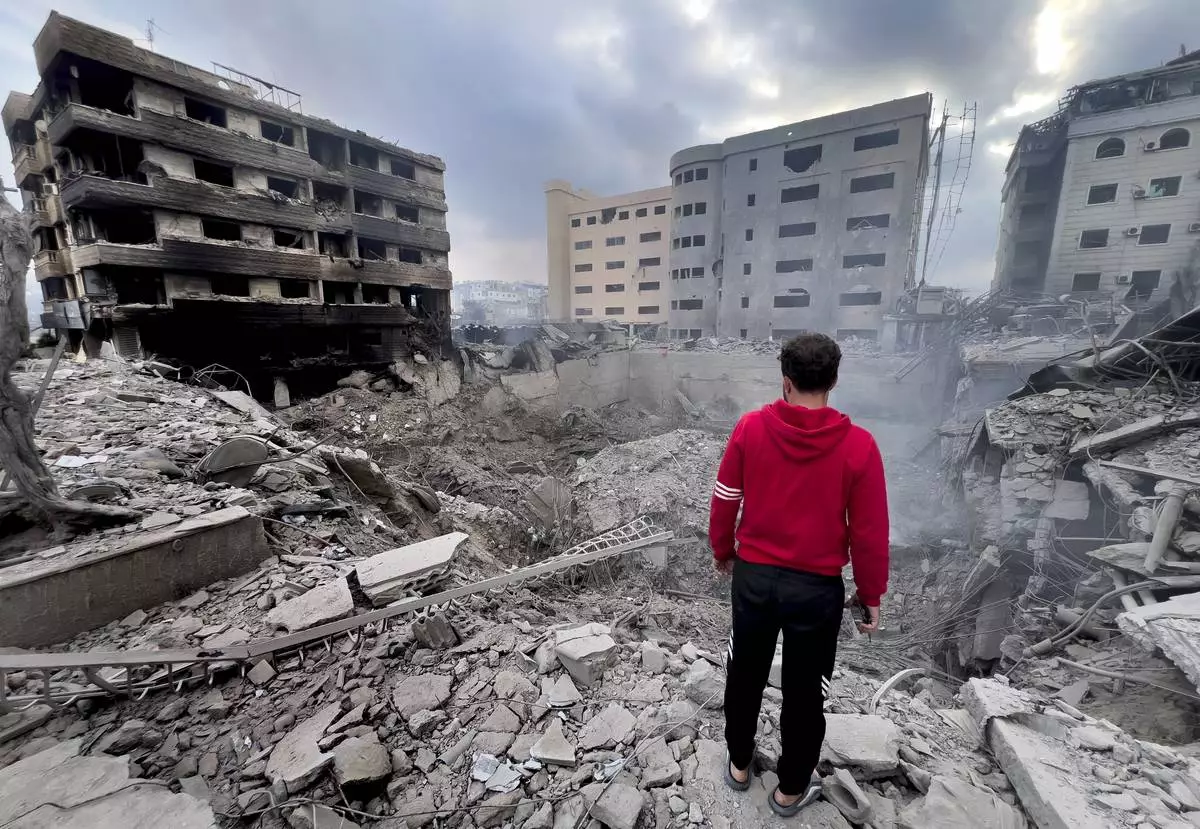
FILE - A man looks at destroyed buildings hit by Israeli airstrikes in the southern suburbs of Beirut, Lebanon, Monday, Oct. 7, 2024. (AP Photo/Hussein Malla, File)
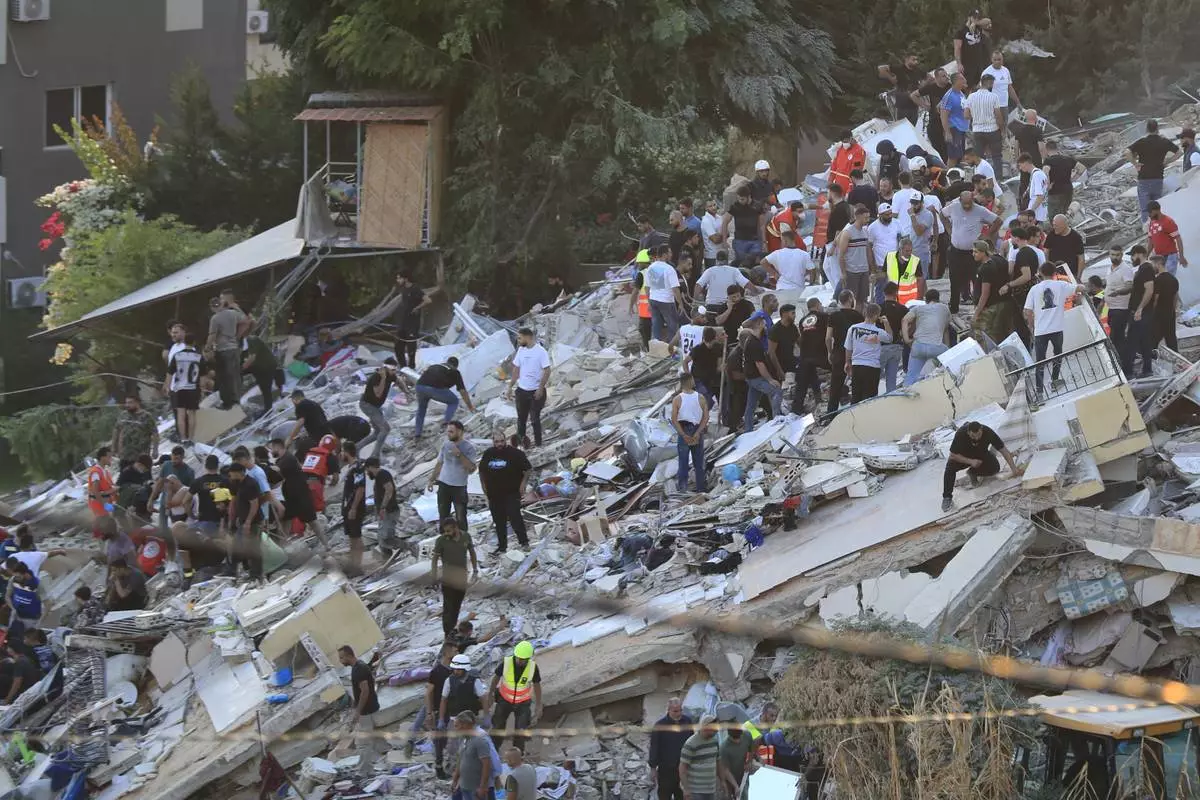
FILE - People and rescue workers search for victims after an Israeli airstrike hit two adjacent buildings, in Ain el-Delb neighborhood east of the southern port city of Sidon, Lebanon, Sunday, Sept. 29, 2024. (AP Photo/Mohammed Zaatari, File)
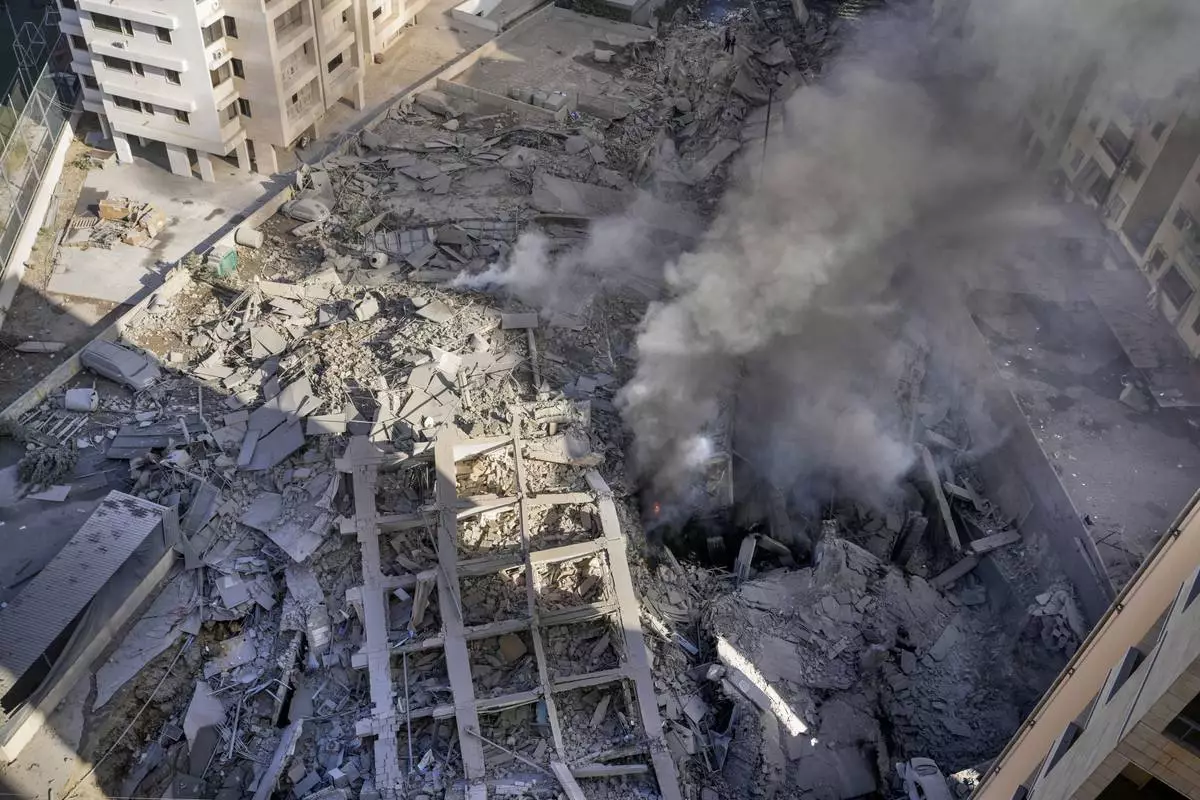
FILE - Smoke rises from the site of an Israeli airstrike in the sourthern suburbs of Beirut's southern suburbs in Lebanon, Wednesday, Oct. 2, 2024. (AP Photo/Hassan Ammar, File)
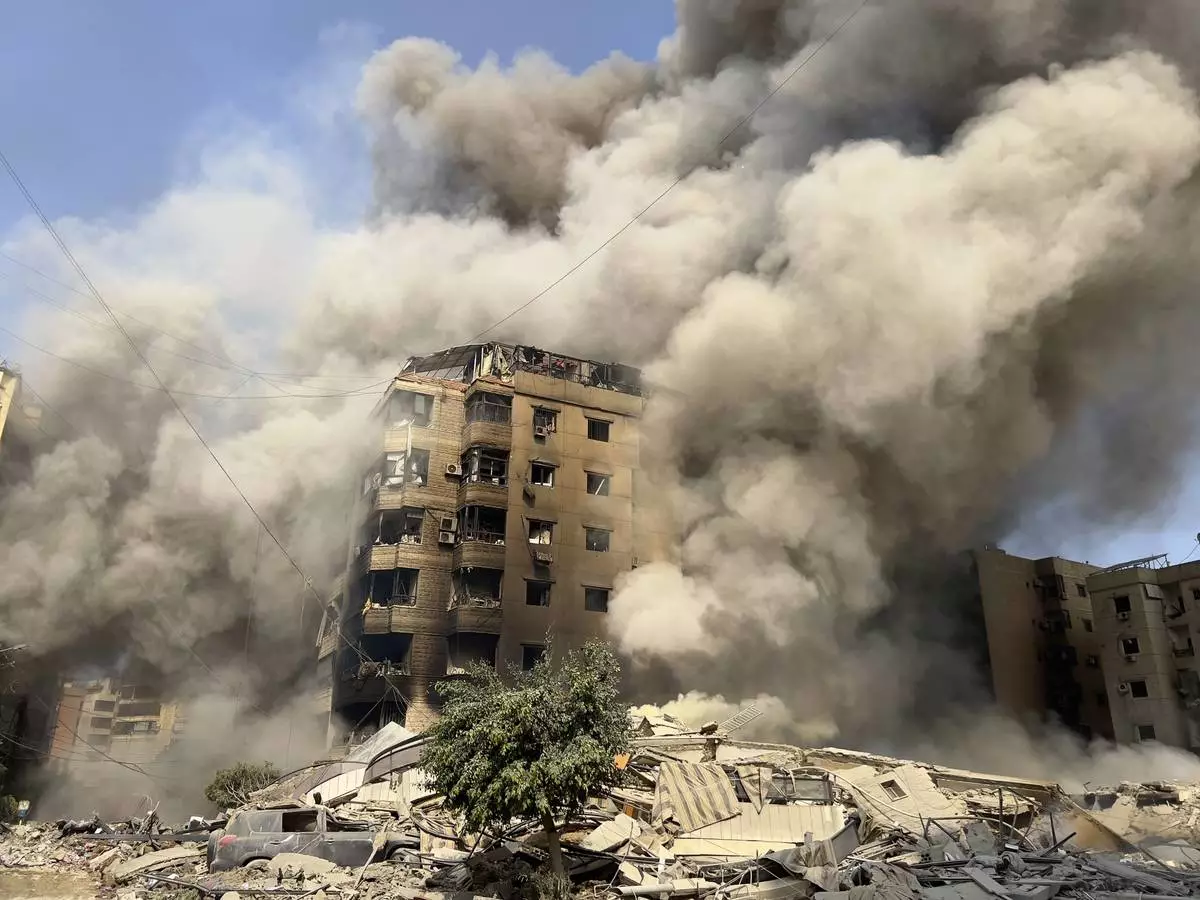
FILE - Smoke rises as a building collapses in Beirut's southern suburbs in Lebanon, Saturday, Sept. 28, 2024. (AP Photo/Hussein Malla, File)
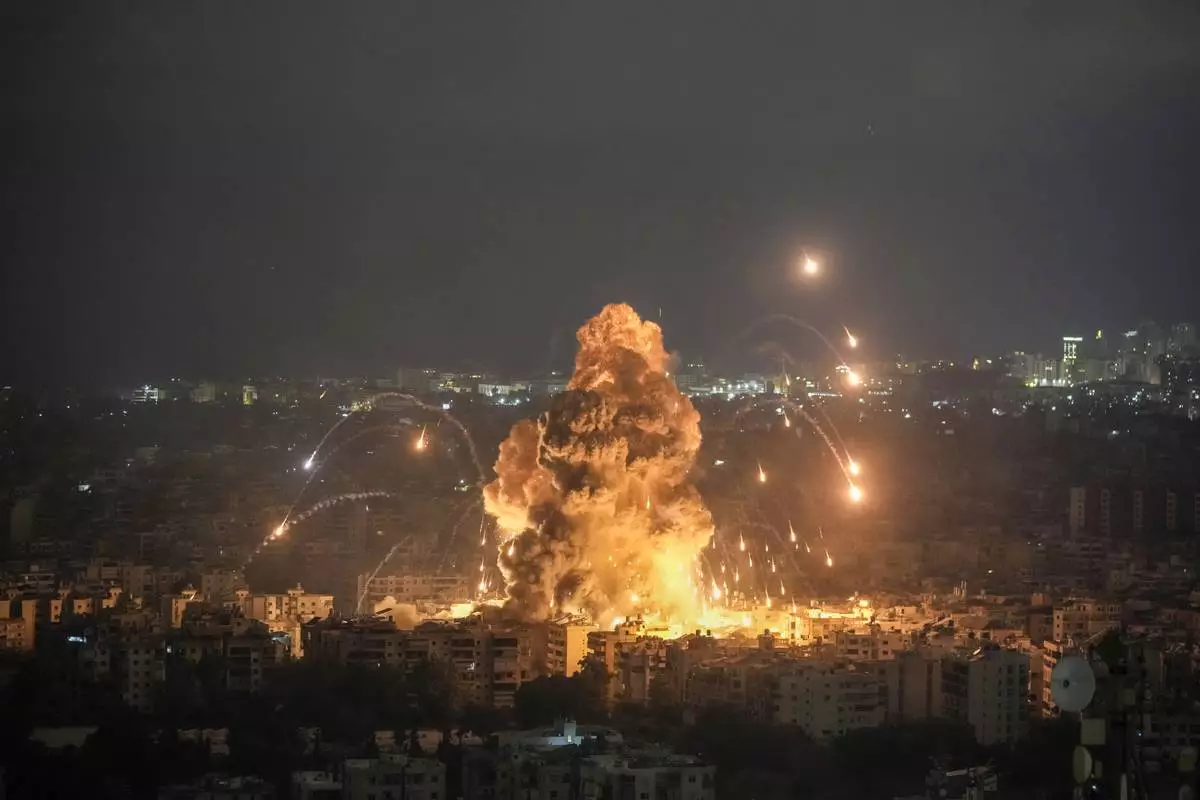
File - Flames and smoke rise from an Israeli airstrike in the southern suburbs of Beirut, Lebanon, Sunday, Oct. 6, 2024. (AP Photo/Bilal Hussein, File)

A mobile phone displays an Israeli alert warning residents of southern Lebanon not to return to their homes until further notice in Beirut, Lebanon, Wednesday, Oct. 9, 2024. (AP Photo/Hussein Malla)

Men read mobile phone alerts telling residents of southern Lebanon not to return to their homes until further notice because of operations Israel says are targeting Hezbollah facilities in Beirut, Lebanon, Wednesday, Oct. 9, 2024. (AP Photo/Hussein Malla)

















